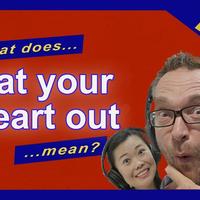What does 'eat your heart out' mean? - YouTube
Feifei: Hello and welcome to
The English We Speak. I'm Feifei...
Rob: ...and I'm Rob. Hello!
In this programme, as you know,
we like to add a little humour
while teaching our phrases.
Feifei: Yes, usually it involves
a misunderstanding. For example,
we often pretend that one of the
presenters doesn't understand
the phrase.
Rob: Yes, they take it too literally:
they only understand its
word-for-word meaning.
Feifei: But with this phrase,
that would just be too horrible.
Rob: And disgusting.
Feifei: And not to mention -
physically impossible.
Rob: So let's not go there.
Today's phrase is: eat your heart out.
Feifei: Scary, huh? Thankfully,
it has nothing to do with eating
an important part of your body.
Rob: It's an unusual expression.
When people say it, they often
follow it with the name
of a famous or successful person
that they want to be compared to.
Feifei: But why? It's easiest to explain
with an example. Imagine you are
painting a picture.
When you finish, you say:
Feifei: Eat your heart out, Picasso!
Rob: And what you are saying is that
your painting is better than Picasso's.
Feifei: But, because Picasso was
a true master and your own work
is probably not at the same level, most
likely you would be saying this as a joke!
Rob: And that's how people often use it:
as a joke. After doing
something impressive, they say
'eat your heart out' followed
by someone who is famous
for doing that thing.
Feifei: For example, after cooking
a fantastic meal, they might say
'eat your heart out', and the name of
a celebrity chef. Even if they don't think
their cooking is better than the chef's.
Rob: It's almost like a fun way
of expressing pride in your work,
without sounding too arrogant.
I think it's best if we hear
a few more examples.
A: What a goal! How did you score that?!
B: Not bad huh?
Eat your heart out, Ronaldo!
I've been practising all month
and think I'm getting pretty good.
Want to hear me sing?
OK, here goes...
Eat your heart out, Beyonce!
A: Would you mind helping me lift this table?
B: No problem, I'll do it.
Eat your heart out, Hulk!
A: Hey, it's just a table,
you're not an Avenger!
Rob: This is The English We Speak
from BBC Learning English.
So there we are - humorously
comparing someone's football skills
to Ronaldo's, their singing ability
to Beyonce's and their
strength to Hulk from the movies.
And we've resisted all temptation to
create a situation where we ask
Feifei to actually eat a heart.
Feifei: Thank goodness.
I really don't feel hungry in any case.
Rob: Neither do I. Bye!

